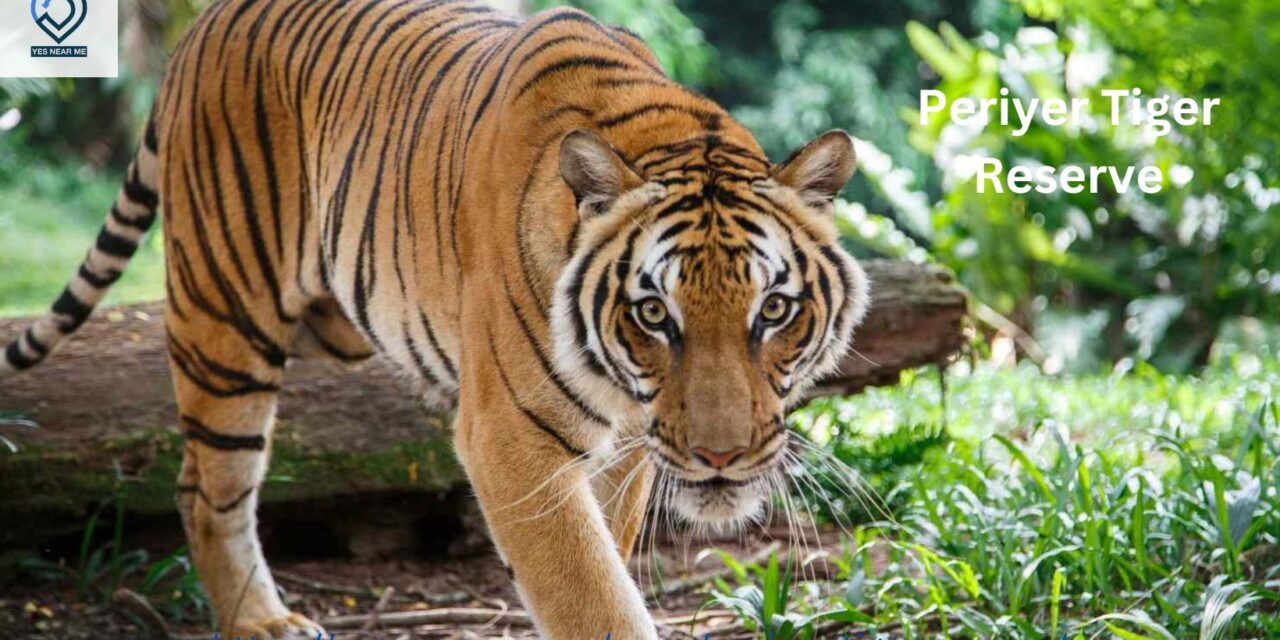Whispers of the Wild: The Periyar Tiger Reserve Experience
Introduction of Periyar Tiger Reserve
-
 Overview of Periyar Tiger Reserve: Periyar Tiger Reserve, located in the Western Ghats of Kerala, is one of India’s most iconic wildlife sanctuaries. It covers an area of about 925 square kilometers and is renowned for its rich biodiversity, with a significant focus on tigers, elephants, and a wide variety of flora and fauna.
Overview of Periyar Tiger Reserve: Periyar Tiger Reserve, located in the Western Ghats of Kerala, is one of India’s most iconic wildlife sanctuaries. It covers an area of about 925 square kilometers and is renowned for its rich biodiversity, with a significant focus on tigers, elephants, and a wide variety of flora and fauna. -
Why it’s called the Heart of Kerala’s Wildlife: Often referred to as the heart of Kerala’s wildlife, Periyar stands as a haven for nature lovers and wildlife enthusiasts. It lies at the intersection of tropical forests, wildlife, and scenic beauty, making it a must-visit for those seeking an authentic Kerala wilderness experience.
Wildlife and Biodiversity:
-
Tigers and Other Predators: The reserve is home to a healthy population of tigers. Visitors can experience the thrill of spotting these majestic creatures in their natural habitat. Periyar also houses other predators such as leopards, wild dogs, and various species of wild cats.
-
 Elephants of Periyar: Periyar is also famous for its large herds of wild elephants. The sight of these gentle giants grazing by the Periyar Lake or marching through the forest is one of the highlights of a visit.
Elephants of Periyar: Periyar is also famous for its large herds of wild elephants. The sight of these gentle giants grazing by the Periyar Lake or marching through the forest is one of the highlights of a visit. -
Birdwatching Paradise: With over 260 species of birds, Periyar Tiger Reserve is a birdwatcher’s paradise. From the rare and endangered species like the Nilgiri wood pigeon to the Malabar grey hornbill, the reserve offers opportunities for spotting some truly spectacular avian life.
-
Other Flora and Fauna: The biodiversity of Periyar extends to various plant species, reptiles, amphibians, and insects. The tropical forests are home to rich plant life, from towering trees to rare orchids. The reserve also protects several species of reptiles like the Indian python and King Cobra.
Scenic Beauty and Landscape:
-
Periyar Lake: A focal point of the reserve, Periyar Lake is a stunning artificial reservoir. The lake provides a scenic backdrop for boat rides, and spotting wildlife like elephants and buffaloes at the shore is a magical experience.
-
Trekking and Nature Walks: Periyar offers several trekking routes that allow visitors to explore its lush forests, rolling hills, and pristine landscapes. Nature walks led by trained guides offer an immersive experience of the reserve’s flora and fauna.
-
The Western Ghats: The reserve is nestled within the Western Ghats, a UNESCO World Heritage Site. The area is rich in both biodiversity and scenic vistas, offering panoramic views of the surrounding mountains and valleys.
Conservation Efforts:
-
History of Conservation: Periyar has long been recognized for its importance in conservation. Established in 1950 as a sanctuary and later upgraded to a tiger reserve in 1978, it has played a significant role in the conservation of tigers and other endangered species in the region.
-
Periyar Tiger Reserve’s Role in Protecting Biodiversity: The reserve’s comprehensive conservation programs include anti-poaching measures, habitat restoration, and wildlife research. The sanctuary also works closely with local communities to promote eco-tourism and raise awareness about wildlife protection.
Activities for Visitors:
-
 Boating in Periyar Lake: Boating is a popular activity in Periyar, where visitors can enjoy serene rides on the lake while keeping an eye out for wildlife along the shores. It’s one of the best ways to see elephants, deer, and other animals up close.
Boating in Periyar Lake: Boating is a popular activity in Periyar, where visitors can enjoy serene rides on the lake while keeping an eye out for wildlife along the shores. It’s one of the best ways to see elephants, deer, and other animals up close. -
Jungle Safaris and Trekking: Guided safari tours and treks allow you to explore the jungle up close. Whether on foot or in a jeep, these safaris provide a chance to encounter wildlife in their natural environment.
-
Eco-Tourism Initiatives: The reserve encourages eco-tourism, offering opportunities for tourists to stay in eco-friendly resorts, interact with the local tribal communities, and learn about the sustainable practices aimed at preserving the local ecosystem.
-
How to Get There:
-
 Location and Access: Periyar Tiger Reserve is located in Thekkady, in the Idukki District of Kerala. It’s well-connected by road from major cities like Kochi, Kottayam, and Madurai.
Location and Access: Periyar Tiger Reserve is located in Thekkady, in the Idukki District of Kerala. It’s well-connected by road from major cities like Kochi, Kottayam, and Madurai. -
Best Time to Visit: The ideal time to visit Periyar is from October to April, when the weather is pleasant and wildlife sightings are more frequent. The monsoon season (June to September) brings lush greenery, but it may limit some activities due to heavy rains.
-
Accommodations: The reserve offers various accommodation options ranging from budget stays to luxury resorts. Many resorts also offer nature walks and wildlife experiences as part of their packages.
-
Free boating begins at 3.30 p.m. (Reporting begins at 3 p.m. at the Kumily Forest Parking location.
Area with independent plans
- Please be patient since animal sightings are purely a matter of luck.
- Please avoid leaving behind trash.
- Respect the wilderness region and the Tiger Reserve region.
- first give way to animals
- Enjoy the hues and sounds of the natural world.
- Dress in colors that complement the surrounding landscape.
- While taking images, try not to disturb any wildlife.
- Observe regional customs.
- Avoid provoking wild animals and maintain a safe distance from them.
- Recycle garbage properly by bringing all non-biodegradable trash home and clearing campsites of trash before leaving.
- Keep in mind that wild animals have the right of way when driving.
- Don’t honk the horn, drive under the posted speed limit, and don’t startle any animals.
- Avoid talking or listening to loud music.
- Avoid exiting the car or
- approach unruly creatures.
- Do not disturb animals when they are sleeping or approach them closer than 15 meters.
- Take no plants or animals, including cuttings and seeds or roots.
- Never give wild animals food.
- Avoid stopping the car in the reserve for more than five minutes.
- Inside such enclosed spaces, do not smoke or start fires. Accidental forest fires result in permanent harm.
- According to the Wildlife (Protection) Act of 1972, carrying firearms or incendiary materials is absolutely forbidden and is a crime.
- Follow the advice of the guides and personnel.
- Rules:
- A minimum of 2 people are needed for each program.
- There can only be two people per tent.
- Children under the age of 12 are not permitted in this program.
- Please report in 15 minutes.
- prior to the start of the program
- Vallakadavu is the starting point. Check-in time for reports is 2:30 p.m.
- Evening tea, dinner, breakfast, and lunch the next day are included in the package.
- Life jackets must be worn at all times while rafting.
Address-:
For questions about tourism:
a center for ecotourism information
tiger reserve in Periyar,
India’s Kerala
Ph: 8547603066
Email address: periyaronline@gmail.com.
Workdays: 6:30 AM to 9:00 PM
To contact us about the Tiger Reserve:
Project Tiger’s Office of the Deputy Director,
tiger reserve in Periyar,
India’s Kerala
Ph: 04869 222027
Email address: ddpttdky@gmail.com
working from 10 a.m. to 5 p.m.
Deputy Director :
Periyar West Division Peerumedu PO
Idukki- 685531
Ph: 04869 232010
more information https://yesnearme.com/news







Recent Comments